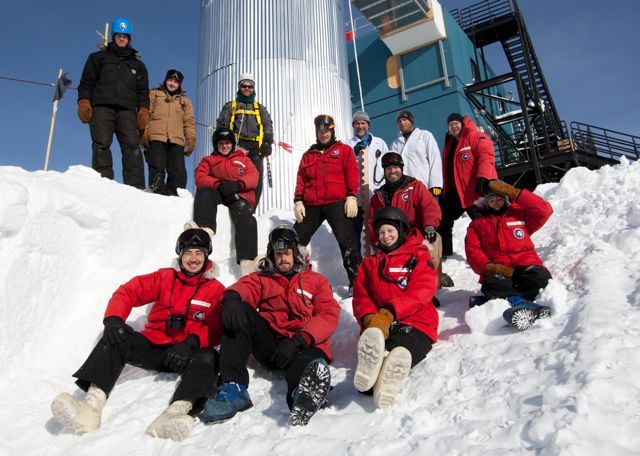It’s been nearly three months since I left the South Pole. When I am asked about the trip I recite my final conclusion about the Pole, “If I could go back tomorrow, I would.” Going to the South Pole and being a part of the IceCube Neutrino telescope team was phenomenal. I only hope that my blogs and communications back to America captured the vibrant spirit of the station, the fond camaraderie of the South Pole team, and the pride that I felt in being involved with IceCube’s completion.
 Katey on the top of the ICL
Katey on the top of the ICL
At this point I’m scarfing up anything that says, IceCube, Antarctic, Neutrino, or South Pole. I hung on to the edge of my seat during newscasts about drilling in Vostock, Antarctica, and quizzed a Physics friend from MIT about how his dark matter collector is similar to ones at the bottom of IceCube. I’m speaking at every public engagement I can about IceCube and I’m enjoying how often colleagues or friends say, “I heard about neutrinos. What are they again?”
IceCube has made a significant impact on my teaching career both in the classroom as a Physics teacher and outside of my classroom as a teacher-leader. Though I’ve used IceCube directly to talk about nuclear reactions and evidence for solar fusion, some of my IceCube instruction has been less direct. Next month I’ll travel to Madison, WI to attend the IceCube completion celebration. I’ll join some old friends for University of Wisconsin’s River Falls’s summer-time Upward Bound program to observe students learning about IceCube. I’ll co-lead a workshop on IceCube in the classroom. I’m speaking to upcoming high school seniors about leadership with this trip and the outreach I’ve done with local and national communities as examples. IceCube has opened many doors for me to meet, interact with, and teach a variety of people from diverse backgrounds about Neutrinos, the South Pole, and scientific inquiry.
 Katey teleconferences with students in the USA from the South Pole.
Katey teleconferences with students in the USA from the South Pole.
My experience surpassed my expectations and I lament the fact that I will likely never return to the Pole. My students tease me that I’ll need to learn to drive a forklift so I can go back. But I can take heart knowing that my students may one day go on to visit the South Pole, many of them are interested. We have talked about possible ways to get there and even researched which universities have projects in Antarctica. If a high school Senior might pick a college based on intramural or travel-abroad opportunities, why shouldn’t he or she consider research-travel opportunities too?
 The ICL Cable Pull Team
The ICL Cable Pull Team
Thanks to my readers, students and civilian, who have made writing this blog, creating movies, and posting pictures so enjoyable. Thanks to everyone who’s followed along as this saga unfolded. I will be active with IceCube into the summer in Washington, DC and in River Falls, WI but after that it’s possible the active participation will wane. From then on IceCube will remain part of my classes and teaching strategy. Sometimes it feels like my trip to the South Pole never happened, like the station is disappearing in my memory as if the white of Antarctica were swallowing it up. To counter that feeling I will try to stay current in my understanding of IceCube’s results, and nimble in the presentation of my knowledge. I am dedicated to being a Polie for life and celebrating the science that I was lucky to be a part of.
 The whole IceCube team poses for a picture by the drill hose. I'm in the first row, second from the right with the black helmet and tan mittens.
The whole IceCube team poses for a picture by the drill hose. I'm in the first row, second from the right with the black helmet and tan mittens.
